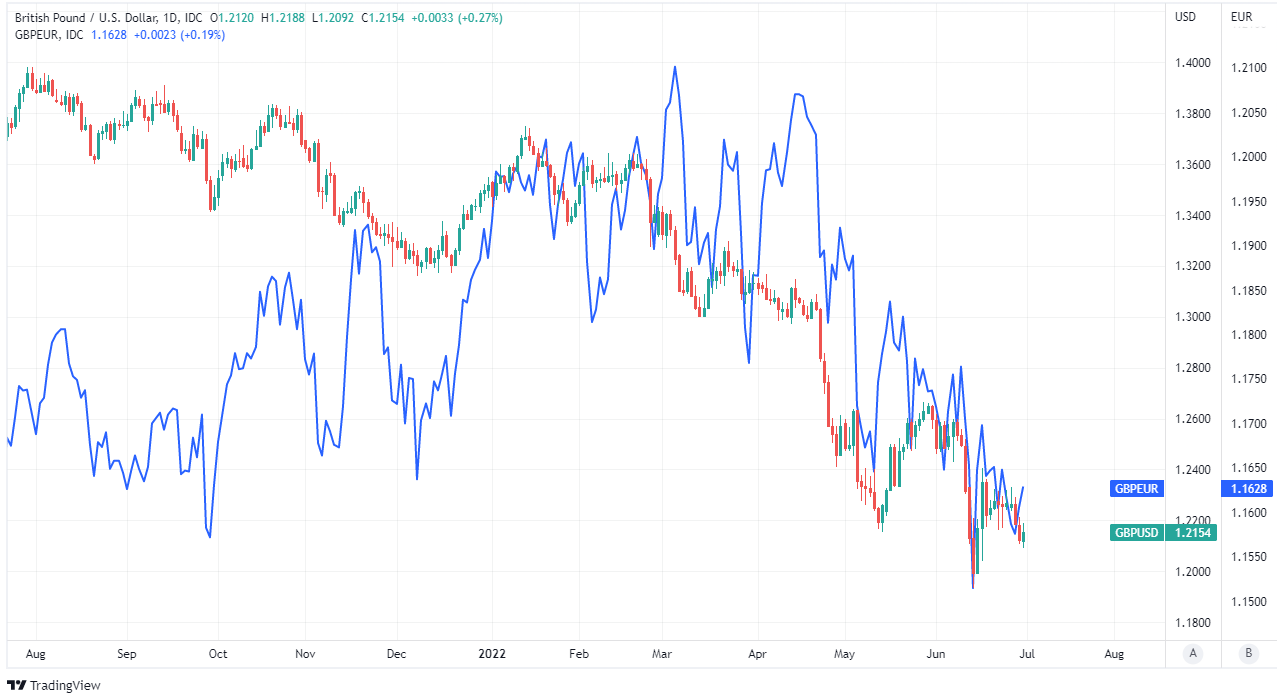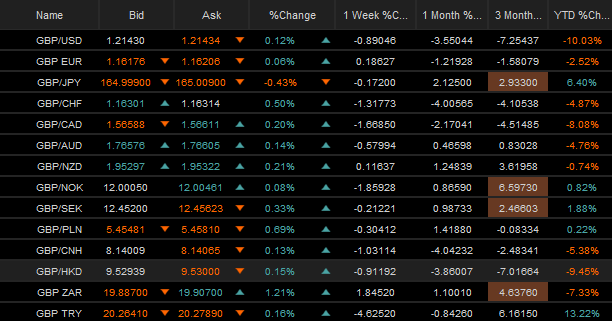Pound Sterling Underperformance May Reflect Softer UK Economy: BoE's Bailey
- Written by: James Skinner
Image © Adobe Images
Pound Sterling underperformed many major counterparts during the first half of the year overall and these losses may be a symptom of underperformance by the UK economy, according to Bank of England Governor (BoE) Andrew Bailey.
Many analysts have wondered aloud in recent weeks about whether currencies and exchange rates are being driven by inflation dynamics or the relative pace of growth in the economies concerned and BoE Governor Andrew Bailey offered his own prognosis on Wednesday.
“I’m not surprised by the path of Sterling and for the reason that I said earlier, because I think the UK economy is probably weakening somewhat earlier and more than others. I think that’s been somewhat evident now for a few months and of course it is over the last few months it’s happened,” he told the European Central Bank Forum on Central Banking this Wednesday.
“It’s very clear that the economy is starting to slow. We are at something of a turning point in that respect and I think the fact that markets are having to take that on board and that the data can be quite choppy at that sort of time is reflected in some of the short run movements we see in markets,” he also later said in response to a question from Bloomberg’s Francine Lacqua.
Above: Selected Pound Sterling exchange rate quotes and performances over various horizons. Source: Netdania Markets.
Compare Currency Exchange Rates
Find out how much you could save on your international transfer
Estimated saving compared to high street banks:
£2,500.00
Free • No obligation • Takes 2 minutes
The above remarks were made during a panel discussion featuring ECB President Christine Lagarde, Federal Reserve Chairman Jerome Powell and General Manager of the Bank for International Settlements, Augustus Carstens.
The UK economy grew by 0.8% during the first quarter of the year, which was faster than the 0.6% increase seen in the Euro area over the same period and a stark contrast with the -1.6% contraction seen in the U.S.
But last quarter’s growth outcome was below the BoE’s forecast and since then there have been numerous signs that elevated energy costs are taking their toll while lifting other prices elsewhere in the economy.
“We had an inflation number our last week and what I thought is that on the surface it was pretty much in line with what we expected. Underneath the surface there was a sign that we saw a shift in the makeup of inflation from the goods supply shock to the energy and food shock, which I would characterise as the post-Covid supply chain shock and moving more into, sadly, the Russia-Ukraine world,” Governor Bailey said on Wednesday.
LIVE: the policy panel at the #ECBForum on Central Banking https://t.co/ZFHX2hjlcD
— European Central Bank (@ecb) June 29, 2022
Governor Bailey made clear in the discussion that the BoE is most concerned with the risk of commodity price increases leading wages to rise faster than they normally would because this could impact other prices in the economy and threaten to sustain inflation above the 2% target for longer.
“This applies to both pay increases and price setting by companies because if everybody tries to beat the inflation and particularly the version we’re having, which is this imported inflation shock and something we can’t avoid, then it will set the second round effects off and of course yes we are seeing some of that tension unfold,” the governor explained in part.
“I think it was likely that we would see this but I have to say the point about second round effects holds as much today as it did then, and that’s the risk. That’s why we will set monetary policy obviously to offset those, if they emerge, to get back to target. And I’m afraid that’s a thin code for saying, the more they emerge, the higher rates will have to be,” he went on to warn.
This is the reason why interest rate risks are on the upside, despite the faltering economy, and that was made unequivocally clear on Wednesday.
 Above: Pound to Dollar rate shown at daily intervals with Pound to Euro rate.
Above: Pound to Dollar rate shown at daily intervals with Pound to Euro rate.
GBP to USD Transfer Savings Calculator
How much are you sending from pounds to dollars?
Your potential USD savings on this GBP transfer:
$1,702
By using specialist providers vs high street banks
“Monetary policy of course has a very important role to play in this because it will act alongside that shock and it’s very important when we come to the language that we use that of course it’s there to tackle the second round effects as they come through price setting and wage setting so the message that we gave and was in the language of our last meeting,” he explained.
“It leaves options on the table and that’s very deliberate. Very deliberate. I mean people can take a message away from that. It’s quite clear that as we respond to this shock, we want to have those options on the table for precisely the reason that Augustin just said. There will be circumstances in which we will have to do more. We’re not there yet in terms of the next meeting. We’re still a month away but that is on the table, but you shouldn’t assume it’s the only thing that’s on the table,” the governor also later cautioned.
Bank Rate was lifted to a post-financial crisis high of 1.25% in June but some measures of market expectations suggest that investors expect it to rise further and far enough so that it reaches almost three percent by year-end.
Governor Bailey’s remarks made clear that economic data and what it says about the risk of “second round effects” such as higher wages and energy-related increases in prices of other products will be the most important determinant of BoE policy decisions in the months ahead.






